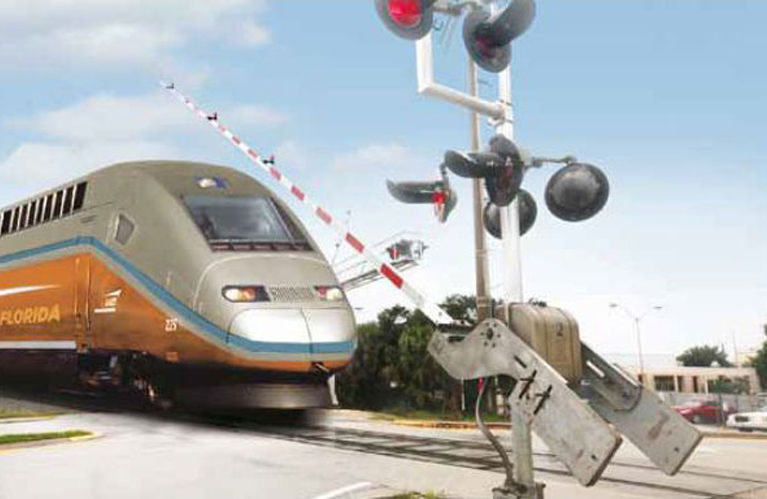
What if all of our ongoing efforts – bogging down the process in the courts, pushing environmental concerns that are being ignored, challenging the rigged game that has allowed All Aboard Florida to roll forward at frightening speeds – aren’t enough to prevent this high-speed boondoggle from disrupting and endangering our community?
What if AAF finds enough dim-witted investors to buy the $1.75 billion in unrated, high-risk, tax-exempt bonds it needs to sell to finance its Orlando-to-Miami passenger rail project, even though every passenger rail service in America – and maybe even the world – loses money?
What if the legal system fails us, the state and federal governments ignore us and, because nobody with any clout cares what happens to the good people of Indian River County and elsewhere along the Treasure Coast, these 100-mph trains run over us?
What then?
Will folks here simply surrender, accepting that their cherished quality of life will never be the same and there’s nothing they can do about it? Will they opt to leave this special place and find a community that isn’t so unnecessarily threatened?
Or will they instead take matters into their own hands, bonding by the thousands to oppose this unwanted invasion by outsiders who have no revenues, no experience running a passenger rail service and, worst of all, no regard for us?
Might we see some new form of protests?
“A lot of people are very upset,” said Vero Beach property rights activist Phyllis Frey, who has been working with three Treasure Coast groups that oppose AAF. “When I was out gathering signatures for petitions, I had a lot of people suggesting some type of civil disobedience, whether it’s parking cars on the tracks or creating human chains.
“When you go out into the community, you can feel the outrage,” she added. “You go to different gatherings, and the tension in the room is very palpable. And what happened last week only made matters worse.”
Last week, the Federal Railroad Administration released the final version of its Environmental Impact Statement, which somehow found AAF posed no significant threat to the environment anywhere along the planned route and that the project largely was in compliance with government regulations.
The findings surprised no one.
Then, one day later, the Florida Development Finance Corp. – a quasi-governmental state agency that met in Orlando – dismissively shrugged off the arguments against the project, and voted unanimously to approve the bonds needed to build its rail service.
No surprise there, either.
The fix has been in from the start: Even though the Treasure Coast counties will see no benefit from the AAF project, which will connect Orlando and Miami with stops only in West Palm Beach and Fort Lauderdale, they lack the political clout to stop it.
Over the past year, as more folks here learned of the detrimental impacts of the plan and it became obvious that the approval process was a charade, opponents have become increasingly hostile towards AAF and its governmental accomplices.
Which is understandable.
“This is a shining example of why we should never give this much power to unelected bureaucrats,” Frey said. “We, the people who live here, have no say in something that is going to have a devastating impact on our community.”
That’s hard to believe … but she’s correct.
Legally, there appears to be nothing we can do to stop AAF from racing through the heart of the county 32 times per day, creating traffic congestion, emergency vehicle delays, excessive noise and vibration, and diminished property values near the tracks.
And that seems wrong.
Residents here should have a legal right to decide whether they want to take on the disruptions and dangers that will be created by AAF.
My guess is, they probably thought they did. Until now.
“Some people are demoralized,” Frey said, referring to the final EIS and bond approval. “They feel worn down, like everyone’s against us, that this thing is a done deal. But I think they’re just tired. Once they regroup, they’ll be back at it.
“This isn’t over,” she added. “We’re raising a lot of money to fight this. There are two lawsuits pending in federal court and one in state court. So there’s hope on that level.
“It’s just a matter of keeping people engaged.”
And angry? Angry enough to protest the intrusion of AAF over their objections by any means available to them?
“The anger is there,” Frey said.
To be frank, though, in this community, I can’t see thousands of residents flocking to our railroad crossings and standing on the tracks. And I’m not alone.
Neither the county sheriff nor the Vero Beach police chief expect any serious trouble when AAF expands its tracks or begins operations.
“We have operational plans for a variety of situations, but I don’t foresee anything like that happening,” Sheriff Deryl Loar said.
Police Chief David Currey said protests would be tolerated, as long as they remained peaceful and did not obstruct pedestrians or traffic, including rail traffic.
“I know it’s a hot topic right now and that people are frustrated, but knowing this community like I do, I don’t think we’ll have any problems,” Currey said. “The people here respect law enforcement enough to avoid crossing the line.”
Let’s all hope it doesn’t come to that.



